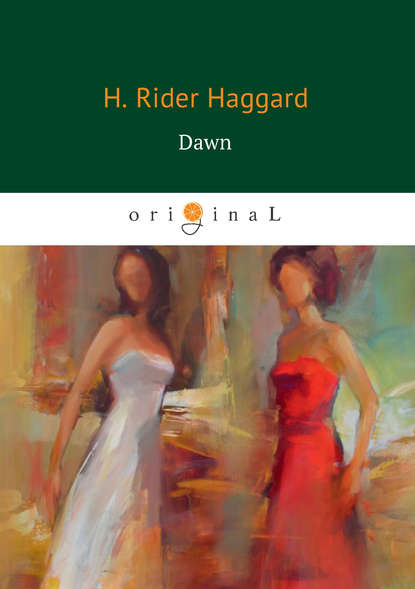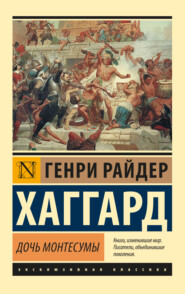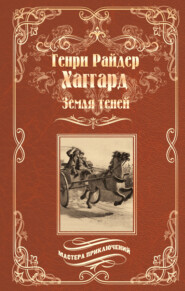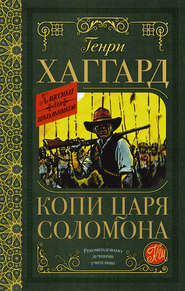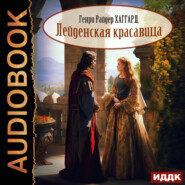По всем вопросам обращайтесь на: info@litportal.ru
(©) 2003-2025.
✖
Dawn
Настройки чтения
Размер шрифта
Высота строк
Поля
"Perhaps,” he replied, politely; "but not half so lovely as their wearer. I wonder,” he added, with a little laugh, "what the old boy would say, if he could know that a thousand pounds of his personalty had gone by anticipation to buy a necklace for Anne Bellamy.”
To this remark she made no reply, being apparently absorbed in her own thoughts. At last she spoke.
"I don’t want to seem ungracious, George, but these”—and she touched the jewels—”were not the reward I expected: I want the letters you promised me back.”
"My dear Anne, you are under a mistake, I never promised you the letters; I said that, under the circumstances, I might possibly restore them—a very different thing from promising.”
Mrs. Bellamy flushed a little, and the great pupils of her sleepy eyes contracted till she looked quite dangerous.
"Then I must have strangely misunderstood you,” she said.
"What do you want the letters for? Can’t you trust me with them?”
"Don’t you think, George, that if you had passed through something very terrible, you would like to have all the mementoes of that dark time destroyed? Those letters are the record of my terrible time; nothing remains of it but those written lines. I want to burn them, to stamp them into powder, to obliterate them as I have obliterated all the past. Whilst they exist I can never feel safe. Supposing you were to turn traitor to me and let those letters fall into the hands of others, supposing that you lost them, I should be a ruined woman. I speak frankly, you see; I fully appreciate my danger, principally because I know that, the more intimate a man and woman have been, the more chance there is of their becoming bitter enemies. George, give me those letters; do not overcloud my future with the shadows of the past.”
"You talk as well as you do everything else, Anne; you are really a very remarkable woman. But, curiously enough, those letters, the existence of which is so obnoxious to you, are to me a source of great interest. You know that I love to study character—curious occupation for a young man, isn’t it? —but I do. Well, in my small experience, I have never yet, either in fiction or in real life, come across such a fascinating display as is reflected in those letters. There I can, and often do, trace in minutest detail the agony of a strong mind, can see the barriers of what people call religion, early training, self- respect, and other curiosities which we name virtues, bursting away one by one under pressure, like the water-tight bulkheads they put in passenger steamers, till at length the work is done; the moral ship sinks, and the writer stands revealed what you are, my dear Anne, the loveliest, the cleverest, and the most utterly unscrupulous woman in the three kingdoms.”
She rose very quietly, but quite white with passion, and answered in her low voice—
"Whatever I am you made me, and you are a devil, George Caresfoot, or you could not take pleasure in the tortures you inflicted before you destroyed. But, don’t go too far, or you may regret it. Am I a woman to be played with? I think that you have trained me too well.”
He laughed a little uneasily.
"There, you see; grattez le Russe, &c., and out comes the true character. Look at your face in the glass; it is magnificent, but not pleasant; rather dangerous, indeed. Why, Anne, do be reasonable; if I gave you those letters, I should never be able to sleep in peace. For the sake of my own safety I dare not abandon the whip-hand I have of you. Remember you could, if you chose, say some unpleasant things about me, and I don’t want that any more than you do just now. But, you see, whilst I hold in my power what would, if necessary, effectually ruin you, and probably Bellamy too—for this country society is absurdly prejudiced—I have little cause for fear. Perhaps in the future you may be able to render me some service for which you shall have the letters—who knows? You see I am perfectly frank with you, for the simple reason that I know that it is useless to try to conceal my thoughts from a person of your perception.”
"Well, well, perhaps you are right: it is difficult to trust oneself, much less any one else. At any rate,” she said, with a bitter smile, "you have given me Bellamy, a start in society, and a sapphire necklace. In twenty years, I hope, if the fates are kind, to have lost Bellamy on the road—he is really unendurable—to rule society, and to have as many sapphire necklaces and other fine things as I care for. In enumerating my qualities, you omitted one, ambition.”
"With your looks, your determination, and your brains, there is nothing that you will not be able to do if you set your mind to it, and don’t make an enemy of your devoted friend.”
And thus the conversation ended.
Now little Bellamy had, after much anxious thought, just about this time come to a bold determination—namely, to asset his marital authority over Mrs. Bellamy. Indeed, his self-pride was much injured by the treatment he received at his wife’s hands, for it seemed to him that he was utterly ignored in his own house. In fact, it would not be too much to say that he was an entire nonentity. He had married Mrs. Bellamy for love, or rather from fascination, though she had nothing in the world—married her in a fortnight from the time that George had first introduced him. When he had walked out of church with his beautiful bride, he had thought himself the luckiest man in London, whereas now he could not but feel that matrimony had not fulfilled his expectations. In the first place, Love’s young dream— he was barely thirty—came to a rude awakening, for, once married, it was impossible—though he had, in common with the majority of little men, a tolerably good opinion of himself—but that he should perceive that his wife did not care one brass farthing about him. To his soft advances she was as cold as a marble statue, the lovely eyes never grew tender for him. Indeed, he found that she was worse than a statue, for statues cannot indulge in bitter mockery and contemptuous comments, and Mrs. Bellamy could, and, what is more, frequently did.
"It is very well,” reflected her husband, "to marry the loveliest woman in the county, but I don’t see the use of it if she treats one like a dog.”
At last this state of affairs had grown intolerable, and, meditating in the solitude of his office, Mr. Bellamy resolved to assert himself once and for all, and set matters on a proper footing, and Mrs. Bellamy in her place. But it is one thing for husbands of the Bellamy stamp to form high-stomached resolutions, and another for them to put those resolutions into active and visible operation on wives of the Mrs. Bellamy stamp. Indeed, had it not been for a little incident about to be detailed, it is doubtful if Mr. Bellamy would have ever come to the scratch at all.
When George had gone, Mrs. Bellamy sat down in by no means the sweetest of tempers to think. But thinking in this instance proved an unprofitable occupation, and she gave it up, in order to admire the sapphire necklace that lay upon her knee. At that moment her husband entered the room, but she took no notice, merely going on examining the stones. After moving about a little, as though to attract attention, the gentleman spoke.
"I have managed to get home to lunch, my dear.”
"Indeed.
"Well, you might take a little notice of me.”
"Why? Is there anything remarkable about you this morning?”
"No, there is not; but, remarkable or not, a man who has been fool enough”—Mr. Bellamy laid great emphasis on the word "fool”– "to get married has a right to expect when he comes into his own house that he will have a little notice taken of him, and not be as completely overlooked as —as though he were a tub of butter in a grocer’s shop;” and he pugged out his chest, rubbed his hands, and looked defiant.
The lady laid her head back on the chair, and laughed with exquisite enjoyment.
"Really, my dear John, you will kill me,” she said at length.
"May I ask,” he replied, looking as though there was nothing in the world that he would like better, "what you are laughing at?”
"Your slightly vulgar but happy simile; it is easy to see where you draw your inspiration from. If you had only said butterine, inferior butter, you know, the counterfeit article, it would have been perfect.”
Her husband gave a glance at his tubby little figure in the glass.
"Am I to understand that you refer to me as ‘butterine,’ Mrs. Bellamy?”
"Oh! certainly yes, if you like; but, butter or not, you will melt if you lose your temper so.”
"I have not lost my temper, madam; I am perfectly cool,” he replied, positively gasping with fury. Here his eye fell upon the necklace. "What necklace is that? who gave you that necklace? I demand to know.”
"You demand to know! Be careful what you say, please. Mr. George Caresfoot gave me the necklace. It cost a thousand pounds. Are you satisfied?”
"No, I am not satisfied; I will not have that cursed George Caresfoot continually here. I will send him back his necklace. I will assert my rights as an Englishman and a spouse, I will—”
"You will sit down and listen to me.”
The tone of the voice checked his absurd linguistic and physical capers, and caused him to look at his wife. She was standing and pointing to a chair. Her face was calm and immovable, only her eyes appeared to expand and contract with startling rapidity. One glance was enough for Bellamy. He felt frightened, and sat down in the indicated chair.
"That’s right,” she said, pleasantly; "now we can have a cosy chat. John, you are a lawyer, and therefore, I suppose, more or less a man of the world. Now, as a lawyer and a man of the world, I ask you to look at me and then at yourself, and say if you think it likely or even possible that I married you for love. To be frank, I did nothing of the sort; I married you because you were the person most suited to my purpose. If you will only understand that it will save us both a great deal of trouble. As for your talk about asserting yourself and exercising your authority, it is simple nonsense. You are very well in your way, my dear John, and a fair attorney, but do you suppose for one moment that you are capable of matching yourself against me? If so, you make a shocking mistake. Be advised, and do not try the experiment. But don’t think that the bargain is all my side—it is not. If you will behave yourself properly and be guided by my advice, I will make you one of the richest and most powerful men in the county. If you will not, I shall shake myself free of you as soon as I am strong enough. Rise I must and will, and if you will not rise with me, I will rise alone. As regards your complaints of my not caring about you, the world is wide, my dear John; console yourself elsewhere. I shall not be jealous. And now I think I have explained everything. It is so much more satisfactory to have a clear understanding. Come, shall we go to lunch?”
But Bellamy wanted no lunch that day.
"After all,” he soliloquized to himself, between the pangs of a racking headache brought on by his outburst of temper, "time sometimes brings its revenges, and, if it does, you may look out, Mrs. Bellamy.”
Chapter XV
It is perhaps time that the reader should know a little of the ancient house and loyalty where many of the personages of whose history these pages treat, lived and moved and had their being.
The Abbey House, so called, was in reality that part of the monastery which had been devoted to the use of successive generations of priors. It was, like the ruins that lay to its rear, entirely built of grey masonry, rendered greyer still by the lichens that fed upon its walls, which were of exceeding strength and thickness. It was a long, irregular building, and roofed with old and narrow tiles, which from red had, in the course of ages, faded to sober russet. The banqueting- hall was a separate building at its northern end, and connected with the main dwelling by a covered way. The aspect of the house was westerly, and the front windows looked on to an expanse of park-like land, heavily timbered with oaks of large size, some of them pollards that might have pushed their first leaves in the time of William the Conqueror. In spring their vivid green was diversified by the reddish brown of a double line of noble walnut-trees, a full half mile in length, marking the track of the carriage- drive that led to the Roxham high-road.
Behind the house lay the walled garden, celebrated in the time of the monks as being a fortnight earlier than any other in the neighbourhood. Skirting the southern wall of this garden, which was a little less than a hundred paces long, the visitor reached the scattered ruins of the old monastery that had for generations served as a stone quarry to the surrounding villages, but of which enough was left, including a magnificent gateway, to show how great had been its former extent. Passing on through these, he would come to an enclosure that marked the boundaries of the old graveyard, now turned to agricultural uses, and then to the church itself, a building with a very fine tower, but possessing no particular interest, if we except some exceedingly good brasses and a colossal figure of a monk cut out of the solid heart of an oak, and supposed to be the effigy of a prior of the abbey who died in the time of Edward I. Below the church again, and about one hundred and fifty paces from it, was the vicarage, a comparatively modern building, possessing no architectural attraction, and evidently reared out of the remains of the monastery.
At the south end of the Abbey House itself lay a small grass plot and pleasure-garden fringed with shrubberies, and adorned with two fine cedar- trees. One of these trees was at its further extremity, and under it there ran a path cut through the dense shrubbery. This path, which was edged with limes and called the "Tunnel Walk,” led to the lake, and debouched in the little glade where stood Caresfoot’s Staff. The lake itself was a fine piece of water, partly natural and partly constructed by the monks, measuring a full mile round, and from fifty to two hundred yards in width. It was in the shape of a man’s shoe, the heel facing west like the house, but projecting beyond it, the narrow part representing the hollow of the instep, being exactly opposite to it, and the sole swelling out in an easterly direction.
Bratham Abbey was altogether a fine old place, but the most remarkable thing about it was its air of antiquity and the solemnity of its peace. It did not, indeed, strike the spirit with that religious awe which is apt to fall upon us as we gaze along the vaulted aisles of great cathedrals, but it appealed perhaps with equal strength to the softer and more reflective side of our nature. For generation after generation that house had been the home of men like ourselves; they had passed and were forgotten, but it remained, the sole witness of the stories of their lives. Hands of which the very bones had long since crumbled into dust had planted those old oaks and walnuts, that still donned their green robes in summer, and shed them in the autumn, to stand great skeletons through the winter months, awaiting the resurrection of the spring.
There lay upon the place and its surroundings a burden of dead lives, intangible, but none the less real. The air was thick with memories, as suggestive as the grey dust in a vault. Even in the summer, in the full burst of nature revelling in her strength, the place was sad. But in the winter, when the wind came howling through the groaning trees, and drove the grey scud across an ashy sky, when the birds were dumb, and there were no cattle on the sodden lawn, its isolated melancholy was a palpable thing.
That hoary house might have been a gateway of the dim land we call the Past, looking down in stony sorrow on the follies of those who so soon must cross its portals, and, to the wise who could hear the lesson, pregnant with echoes of the warning voices of many generations.
Here it was that Angela grew up to womanhood.
Some nine and a half years had passed from the date of the events described in the foregoing pages, when one evening Mr. Fraser bethought him that he had been indoors all day, and proposed reading till late that night, and that therefore he had better take some exercise.





